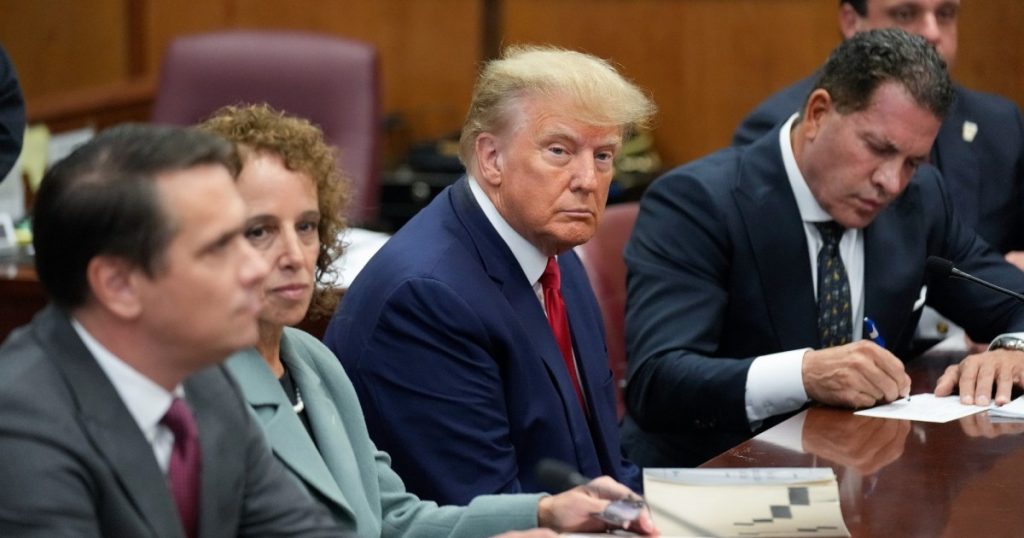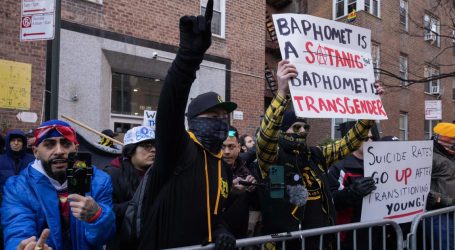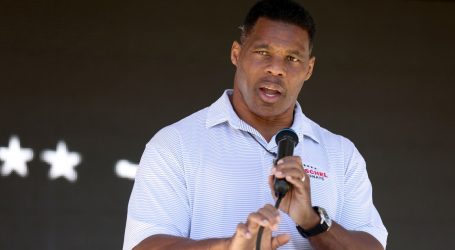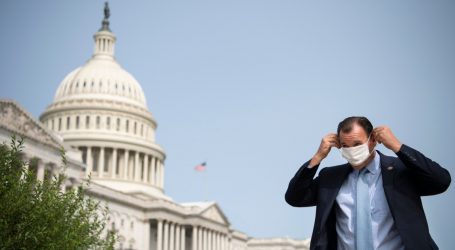Trump Indicted on 34 Felony Counts
Former President Donald Trump sits at the defense table with his defense team in a Manhattan court, Tuesday, April 4, 2023.Seth Wenig/AP
Fight disinformation: Sign up for the free Mother Jones Daily newsletter and follow the news that matters.Former President Donald Trump on Tuesday was formally arrested, fingerprinted, and charged with 34 felony counts of falsifying business records related to hush money payments that he allegedly made in 2016 to cover up an affair with adult film star Stormy Daniels. Trump, who denies that an affair took place, pleaded not guilty to all 34 counts.
Trump arrived at the New York Supreme Court in lower Manhattan around 1:30 pm and was promptly arrested and brought to the office of Manhattan District Attorney Alvin Bragg. Outside, several hundred pro- and anti-Trump protesters traded insults, while random attention-seekers—a man on roller skates, balancing a basketball—and a large mob of reporters circulated. Trump was finger-printed and read his rights and then waited in an interview room, technically under arrest but not handcuffed or in a cell. He was then led down a corridor in front of news cameras and reporters and into a courtroom. Trump, looking sullen, did not stop to address the journalists.
Donald Trump arrives at court, Tuesday, April 4, 2023, in New York.
Mary Altaffer / APInside the courtroom, Judge Juan Merchan—the same judge who oversaw the recent trial of two of Trump’s businesses on tax fraud charges—attempted to keep a lid on the chaos that follows Trump; he allowed in just one photographer, who snapped photos of Trump at the defense table.
In a statement of facts accompanying the indictment, Bragg’s office alleged that between 2015 and 2017, Trump “orchestrated a scheme with others to influence the 2016 presidential election by identifying and purchasing negative information about him to suppress its publication and benefit [his] electoral prospects.” The prosecutors stated that participants in this scheme “violated election laws and made and caused false entries in the business records of various entities in New York.”
Bragg’s office referred to the so-called “Catch and kill” arrangement Trump allegedly had with the National Enquirer, in which the tabloid would bury negative stories about Trump by paying sources not to reveal the relevant information to anyone else. Bragg’s office stated that the overall scheme involved three separate negative stories:
A $30,000 payment made by the National Enquirer to a Trump Tower doorman who said he had a story about Trump fathering a child out of wedlock. The doorman’s story was later determined to be false.
A $150,000 National Enquirer payment to a woman who said she had an extra-marital affair with Trump—presumably a reference to former Playboy Playmate Karen McDougal. Bragg’s office says Trump tried to reimburse the publication. (Trump has denied having an affair with McDougal.)
The $130,000 payment to Stormy Daniels, made by former Trump lawyer Michael Cohen, who Trump later reimbursed.
The statement of facts referred to an audio recording—which has previously been reported—of discussions between Trump and his former attorney Michael Cohen (referred to as “Lawyer A” in the court documents) about how to handle the payments to McDougal:
Lawyer A told the Defendant he would open up a company for the transfer of Woman 1’s account and other information, and stated that he had spoken to the Chief Financial Officer for the Trump Organization (the “TO CFO”) about “how to set the whole thing up.”
The statement of facts also claims that Trump initially agreed to pay Daniels $130,000 but then tried to delay, saying that if the payments could be held off until after the election, “they could avoid paying altogether, because at that point it would not matter if the story became public.”
At a press conference following Trump’s court appearance, Bragg laid out his reasons for pursuing the case.
“As this office has done time and time again, this office upholds our solemn responsibility to ensure everyone stands equal before the law,” he said. “No amount of money and no amount of power changes that enduring American principle.”
Bragg was asked why he was prosecuting Trump now, years after the 2016 campaign.
“I bring cases when they’re ready,” he said.





